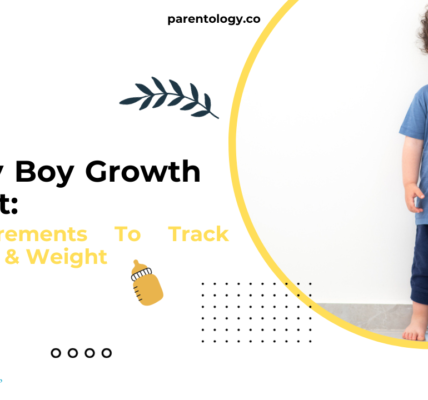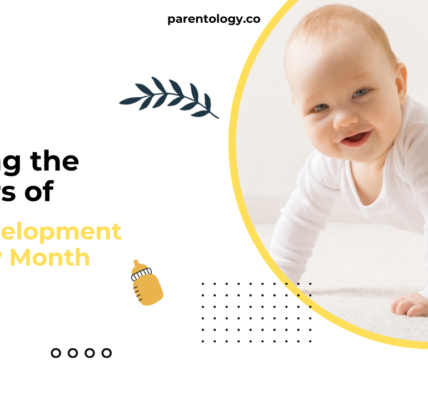A Comprehensive Guide to Your 5-Month-Old’s Development and Milestones
As a parent, witnessing the growth and development of your little one is nothing short of magical. At 5 months old, your baby is embarking on a journey of discovery, reaching milestones that showcase their emerging personality and abilities. In this comprehensive guide, we’ll delve into the enchanting world of a 5 month milestones of baby’s development, exploring key milestones and providing invaluable insights into their growth.
Understanding 5 Month Milestones
The World of Movement
At 5 months, your baby is likely showing signs of increased mobility. Rolling over becomes a common feat, offering a glimpse into their developing motor skills. Propping themselves up on their elbows during tummy time is an exciting milestone, setting the stage for future crawling adventures.
Grasping the World
One of the most delightful aspects of a 5-month-old’s development is their growing ability to grasp objects. Toys placed within reach become fascinating playmates, promoting hand-eye coordination and fostering a sense of exploration.
Babbling Beginnings
Vocalizations take center stage as your baby starts to babble and coo. This marks the beginning of their communication journey, with each gurgle and giggle serving as a charming glimpse into their developing language skills.
Sleep Patterns
By the 5-month mark, many babies start to establish more predictable sleep patterns. While individual variations exist, you might notice longer stretches of nighttime sleep, bringing a welcome sense of routine to your daily life.
Social Smiles
Prepare for heartwarming moments as your baby begins to offer social smiles. Responding to your expressions and gestures, they are building the foundation for social interactions and forming strong emotional bonds.
Nurturing the Growing Mind and Body
Sensory Exploration
Encourage sensory exploration by introducing a variety of textures, colors, and sounds. Soft fabrics, visually stimulating toys, and soothing music can captivate your baby’s curious mind.
Reading Together
Even at 5 months, reading together fosters a love for language and stimulates cognitive development. Choose board books with vibrant pictures and simple stories to engage your baby’s senses.
Introduction to Solids
Around the 5-month mark, you may consider introducing single-grain baby cereal or pureed fruits. Always consult with your pediatrician to ensure a smooth transition to solid foods.
Interactive Playtime
Engage in interactive playtime to enhance bonding and stimulate your baby’s cognitive and motor skills. Activities such as peek-a-boo and gentle tickling can elicit joyful responses.
Growth Markers: Physical and Cognitive Development
Motor Skills Advancement
At 5 months, your baby’s motor skills are on an exciting trajectory. Many infants can support their weight on their legs when held in a standing position. This not only signifies growing leg strength but also hints at the development of future standing and walking abilities.
Visual Stimulation
Your baby’s vision is becoming more refined, allowing them to focus on objects and track movements. Introduce brightly colored toys or objects within their line of sight to stimulate their visual senses and encourage visual tracking.
Introduction to Solid Foods
As your baby continues to grow, the introduction to solid foods becomes a key focus. While breastfeeding or formula remains the primary source of nutrition, you can gradually introduce pureed fruits and vegetables. This serves as a stepping stone towards a diverse and balanced diet.
Sleep Environment Optimization
Creating a conducive sleep environment is crucial for both your baby’s well-being and your own. Ensure the room is comfortably cool, use blackout curtains to dim the light, and maintain a consistent bedtime routine to signal that it’s time to wind down.
Cognitive Engagement: Enriching Your Baby’s Mind
Musical Exploration
Expose your baby to a variety of gentle, melodic tunes. Musical toys or lullabies can captivate their interest and promote a sense of rhythm, contributing to early cognitive development.
Mirror Play
Babies often find fascination in their own reflection. Use a baby-safe mirror during playtime to encourage self-recognition and boost their understanding of the surrounding world.
Responsive Communication
Respond promptly to your baby’s coos, babbles, and gestures. This responsive communication fosters a sense of security and supports their emerging language skills.
Interactive Games
Simple games like “peek-a-boo” and “pat-a-cake” not only bring joy but also enhance your baby’s understanding of cause and effect, laying the foundation for cognitive growth.
Health and Safety: Prioritizing Your Baby’s Well-being
Vaccination Schedule
Ensure your baby is up-to-date with their vaccination schedule. At 5 months, your little one may be due for additional vaccinations, protecting them against various illnesses. Consult with your pediatrician to confirm and discuss any concerns you may have.
Babyproofing Essentials
As your baby becomes more mobile, it’s essential to babyproof your living spaces. Install safety gates, secure heavy furniture to walls, and cover electrical outlets to create a safe environment for exploration.
Regular Developmental Check-ups
Regular visits to the pediatrician are crucial for monitoring your baby’s growth and development. These check-ups allow healthcare professionals to address any concerns, provide guidance, and ensure your baby is thriving.
Nutrition Essentials: Supporting Healthy Growth
Breastfeeding or Formula Feeding
Whether you’re breastfeeding or using formula, both provide essential nutrients for your baby’s growth. Ensure a comfortable and quiet feeding environment to enhance bonding during this special time.
Introduction to Solids: A Gradual Process
Introducing solids is a gradual process. Begin with single-grain cereals and pureed fruits or vegetables. Pay attention to your baby’s cues, and avoid introducing multiple new foods at once to monitor for any potential allergies.
Hydration Awareness
Monitor your baby’s hydration, especially in warmer months. If you’re breastfeeding, your baby may not require additional water until they begin eating solid foods. Consult with your pediatrician for personalized guidance.
Social Development: Building Connections
Recognizing Familiar Faces
At 5 months, your baby is becoming more attuned to familiar faces, especially those of immediate family members. Enjoy moments of connection as they light up with recognition when they see you or other loved ones.
Playdates and Social Interaction
Introduce your baby to short playdates with other infants or family members. These interactions promote social skills, sharing, and the joy of companionship. Choose safe environments and allow your baby to explore social dynamics at their own pace.
Baby’s Emotional Expressions
Observe your baby’s emotional expressions closely. They are learning to express a range of emotions, from joy and excitement to frustration. Responding sensitively to their cues fosters emotional intelligence and a secure attachment.
Parental Self-Care: Nurturing the Caregiver
Prioritizing Rest
As your baby reaches the 5 month milestones, balancing their needs with your own is crucial. Ensure you prioritize rest, taking short breaks during nap times, and seeking support from friends or family when needed.
Connecting with Other Parents
Joining parenting groups or attending local baby classes provides an excellent opportunity to connect with other parents. Share experiences, gain insights, and build a support network that understands the joys and challenges of parenthood.
Celebrating Small Wins
Parenting is a series of small victories. Celebrate the little wins – the first uninterrupted night of sleep, a successful feeding session, or a heart-melting smile. Acknowledging these moments contributes to a positive parenting experience.
Outdoor Exploration: Stimulating the Senses
Nature Walks and Outdoor Play
As your baby’s curiosity grows because of 5 month milestones, and consider gentle outdoor activities. Take short nature walks, allowing them to experience the sights, sounds, and fresh air. Soft grass or a blanket in a shaded area can serve as a delightful space for supervised tummy time.
Sensory Play with Nature
Engage your baby in sensory play using elements from nature. Feel the texture of leaves, let them listen to the rustling of trees, or introduce them to the warmth of sunlight. These experiences enrich their sensory development and create positive associations with the outdoors.
Safe Sun Exposure
If you venture outdoors, ensure your baby is protected from direct sunlight. Dress them in lightweight clothing, use a wide-brimmed hat, and apply a baby-safe sunscreen to any exposed skin. Outdoor exposure contributes to Vitamin D synthesis, promoting overall health.
Introducing Basic Sign Language: A Unique Communication Approach
Simple Signs for Everyday Needs
Around 5 months, some babies can start understanding basic sign language cues. Introduce signs for “milk,” “more,” and “all done” to facilitate communication before verbal language fully develops. This can reduce frustration for both you and your baby.
Consistency in Signing
Be consistent in using signs during daily routines. Repetition helps reinforce the association between signs and meanings. Celebrate when your baby successfully mimics a sign, fostering a sense of accomplishment.
Enhancing Parent-Baby Communication
While your baby’s verbal communication is still emerging, introducing sign language provides an additional avenue for expression. It enhances their ability to convey needs and feelings, strengthening the parent-child bond.
Unlock the Next Chapter
As you marvel 5 month milestones of your baby see your 5-month-old’s achievements, remember that every milestone is a step towards a brighter future. Stay attuned to your baby’s needs, embrace the spontaneity of parenthood, and relish in the joy of nurturing a growing, thriving individual.
Celebrating Progress: Your Baby’s Unique Journey
As 5 month milestones of your baby continues to blossom, relish in the uniqueness of their journey. Every giggle, every new discovery, and every milestone achieved is a testament to their individuality. Embrace the evolving dynamics of parenthood, where each day brings fresh wonders and opportunities for connection.
Conclusion: Celebrating Every Milestone
In the mesmerizing journey of parenting of , each milestone your baby achieves is a cause for celebration. From the first toothless grin to the triumphant roll, every moment is a testament to the incredible growth unfolding before your eyes. Cherish these precious months and relish in the joy of nurturing a 5 month milestones of babies on the brink of new discoveries.
Parentology – Explore more naming trends and cultural insights for your parenting journey. Also learn more about only child syndrome, baby feeding, baby sleeping, baby growing from Parentology.
FAQs: Unraveling Parental Queries on 5 Month Milestones
Q1: When do babies typically start teething?
A1: Teething usually begins between 4 to 7 months, so it’s common for some babies to start showing signs of discomfort around the 5-month mark.
Q2: How can I encourage my baby’s tummy time?
A2: Place colorful and engaging toys within their reach during tummy time to keep them entertained and motivated.
Q3: Should I be concerned if my baby isn’t rolling over yet?
A3: Every baby develops at their own pace. If your baby hasn’t started rolling over, consult with your pediatrician for personalized guidance.
Q4: What are the signs that my baby is ready for solid foods?
A4: Look for signs such as increased head control, sitting with support, and showing interest in what you’re eating. Consult your pediatrician before introducing solids.
Q5: Is it normal for my baby to wake up at night?
A5: Night waking is common at this age. Ensure a comforting bedtime routine and create a conducive sleep environment.
Q6: How can I soothe my teething baby?
A6: Provide teething toys, offer a clean, cool washcloth for them to gnaw on, and consider using a pediatrician-approved teething gel.
Q7: What are signs of a growth spurt?
A7: Increased fussiness, more frequent feedings, and sudden changes in sleep patterns can indicate a growth spurt.
Q8: When should I be concerned about my baby’s development?
A8: Trust your instincts, but consult with your pediatrician if you have concerns about your baby’s motor, cognitive, or social development.
Q9: How can I promote healthy sleep habits?
A9: Establish a consistent bedtime routine, create a conducive sleep environment, and respond to your baby’s cues for naps and bedtime.
Q10: What activities promote sensory development?
A10: Sensory-rich activities like playing with textured toys, exploring different fabrics, and listening to soothing music can enhance your baby’s sensory development.
Infographics-





